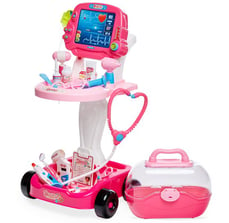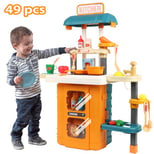
How to Deal with Tantrums Like a Pro: A Helpful Guide for Parents
What are the common triggers for childhood tantrums? How can parents remain calm and empathetic when dealing with a tantrum? What are some immediate strategies for de-escalating an active tantrum? How can parents establish a structured routine to prevent future tantrums? What are the signs that a child may need professional help for their tantrums? How can parents build long-term emotional regulation skills in their children?
12/31/20248 min read

What makes a parent good at handling tantrums? How can they learn to manage these tough moments with ease? Dealing with tantrums is a big part of parenting. It's key for both the parent's and child's happiness.
Learning to handle tantrums well is vital. It helps create a healthy and caring environment. By using the right parenting tips, parents can lower stress and make things better for their kids.
Getting good at managing tantrums takes knowing about child growth and using smart strategies. Parents looking to improve will find it's not just about reacting. It's also about stopping tantrums before they start.
By understanding why tantrums happen, being proactive, and knowing how to respond, parents can feel more confident. They can handle these tough moments better.
Key Takeaways
Understanding the underlying causes of tantrums is essential for effective management
Developing a proactive approach can help prevent tantrums from occurring
Learning how to deal with tantrums like a pro: a parent's guide requires a comprehensive understanding of child development
Parenting tips for handling tantrums like a pro can reduce stress and create a more positive experience for children
Effective tantrum management involves a combination of prevention strategies and response techniques
By adopting a supportive and informed approach, parents can become more confident in their ability to manage tantrums
Understanding the Science Behind Childhood Tantrums
Childhood tantrums are a normal part of growing up. Knowing the science behind them is key for parents. Research shows tantrums are caused by age, emotional control, and the environment. Each child is different, so parents need a tailored approach to handle tantrums.
Young kids often struggle to control their emotions, leading to tantrums. Parents should stay calm and supportive. A good parent’s guide for tantrums includes tips like setting routines, using positive words, and talking openly.
Understanding tantrums and finding ways to manage them helps kids control their emotions. This can make family life better and help kids grow into happy adults. A detailed parent’s guide for tantrums offers valuable advice for dealing with these tough moments.
How to Deal with Tantrums Like a Pro: A Parent's Guide
Handling tantrums can be tough for parents, but it's doable with the right strategy. Building a strong bond with your child is key. This means listening well, understanding their feelings, and setting clear rules. It's also important to show empathy and understanding to calm things down.
By following these tips, parents can make a safe space for their kids to express themselves. This can make tantrums less common and less intense. Setting a daily routine helps kids feel secure and learn to control their emotions. Also, praising good behavior can encourage it and reduce tantrums.
Good communication is vital in managing tantrums. Parents should try to understand what's causing their child's behavior. Then, they can talk about it calmly. This helps kids learn to manage their emotions and reduces tantrums. With patience and the right approach, parents can help their kids grow up happy and well-adjusted.
Immediate Response Strategies for Active Tantrums
Handling active tantrums requires effective strategies. Parenting tips suggest staying calm and patient. This helps de-escalate the situation and creates a safe space for your child to express feelings.
Child psychologists advise using active listening to find the tantrum's cause. Get down to your child's level, make eye contact, and acknowledge their feelings. This makes your child feel heard and validated, lowering tantrum intensity.
Positive language is also key. Set clear boundaries and offer choices to encourage good behavior. This helps your child learn self-regulation and reduces tantrums.
By following these tips, parents can manage tantrums effectively. This promotes healthy emotional growth and strengthens parent-child bonds. Remember, staying calm and patient is crucial in handling tantrums and creating a positive environment for your child.
Prevention Strategies That Really Work
Dealing with tantrums starts with prevention. Understanding what causes tantrums helps parents reduce them. A key guide is learning how to prevent tantrums effectively.
Prevention is simple. Keep a routine, meet basic needs, and praise good behavior. These steps are crucial in managing tantrums.
Children love routine and predictability. A daily routine helps prevent tantrums. Also, meeting basic needs like healthy snacks and drinks is important.
Identifying and managing triggers like tiredness or hunger is key. This helps prevent tantrums before they start.
Positive reinforcement is vital in preventing tantrums. Praising good behavior helps children manage their emotions. This approach is essential in dealing with tantrums.
By using these strategies, parents can reduce tantrums. They help their child develop emotional management skills. This leads to positive behavior and emotional growth.
The Role of Routine and Structure in Reducing Tantrums
Creating a routine and a structured environment can really help cut down tantrums in kids. It's key to have a daily schedule for meals, sleep, and fun activities. This makes kids feel safe and in charge, which lowers tantrum chances. Experts say being consistent and predictable is crucial for kids.
It's also important to plan for changes in the day. Warn kids before moving from one thing to another. This lets them get ready and adjust. Being clear about what's expected helps kids understand their role in different situations. A structured home helps kids learn to manage their feelings better.
Using these tips can make your home a happier place. Handling tantrums takes patience, consistency, and understanding each child's needs. With the right approach, parents can help their kids manage their emotions better. This strengthens their bond and makes family life more positive.
Age-Specific Approaches to Tantrum Management
Children grow and change, and so do their tantrum needs. Experts say it's key to use age-specific strategies. For example, toddlers can't always say how they feel. So, parents should use simple words to help them understand and control their emotions.
When kids get to preschool age, they start to test limits and want to be independent. It's important to set clear rules and consequences. But also, encourage them to talk about their feelings. Positive rewards can help them behave better and reduce tantrums.
For school-age kids, teaching them to manage their emotions is crucial. This includes deep breathing, counting, and solving problems. Experts say parents should help kids learn these skills. This way, kids can handle tantrums better and grow more confident and strong.
Building Long-Term Emotional Regulation Skills
Teaching kids to manage their emotions is key for their growth. By using tantrum management strategies every day, parents can boost their child's emotional smarts. This means helping them understand and share their feelings, and showing them how to act positively.
As kids get better at handling their emotions, they face less stress. This means fewer tantrums for them.
Parents can follow parenting advice for tantrums to help their child's emotional growth. For example, making a safe space for feelings can help. Also, activities like role-playing and storytelling can teach kids to manage their emotions.
By focusing on emotional skills, parents help their kids become emotionally smart and balanced. This can lead to better relationships, school performance, and happiness.
As kids grow, they'll face many challenges that might cause tantrums. But with the right tools, parents can help them handle these situations better. By using tantrum management strategies and parenting advice for tantrums, parents can give their kids a strong emotional base for the future.
When to Seek Professional Help
As a parent, knowing when to seek professional help for your child's tantrums is key. A parent’s guide for tantrums can offer great advice. But, sometimes, deeper issues might be at play. If your child's tantrums keep happening, are very intense, or happen often, it could mean there's a bigger problem.
Experts say if your child's tantrums include aggression, self-harm, or pulling away, you should get help from a mental health expert. A how to deal with tantrums like a pro: a parent's guide can help, but a pro can offer tailored support and therapy. They can figure out why your child is having tantrums and teach you how to handle them.
If you're feeling overwhelmed or can't manage your child's tantrums, it's time to get professional help. A pro can give you the support and advice you need to teach your child to control their emotions. Getting help early can stop bigger problems from happening and help your child grow well.
Remember, asking for professional help shows you're strong, not weak. It takes bravery to say you need help, and it's crucial for your child's health. With the right support, you can help your child overcome tantrums and become a happy, healthy person.
Conclusion: Becoming a Tantrum Management Expert
As parents, dealing with childhood tantrums can be tough. But, with the right strategies and patience, you can master it. Understanding why tantrums happen and knowing how to prevent and respond is key. This way, you'll learn to manage tantrums effectively.
Every child is different, so what works for one might not work for another. Stay open to trying new things. See tantrums as chances to grow and learn, for both your child and you. With time, you'll get better at handling tantrums with understanding and grace.
FAQ
What are the common triggers for childhood tantrums?
Tantrums in kids can happen for many reasons. These include being tired, hungry, or frustrated. They can also happen when kids feel too much stimulation or can't express their needs well. Knowing what triggers a tantrum can help parents stop them before they start.
How can parents remain calm and empathetic when dealing with a tantrum?
It's important for parents to stay calm and understand their child's feelings during a tantrum. They should breathe deeply, speak softly, and show they get what the child is feeling. At the same time, they need to set clear rules and help the child through the tantrum.
What are some immediate strategies for de-escalating an active tantrum?
To calm a tantrum down, try removing the child from what's causing the upset. Offer a different activity or use calming tools like deep breathing. The goal is to help the child feel in control again.
How can parents establish a structured routine to prevent future tantrums?
Having a regular routine can really help prevent tantrums. Parents should set clear rules, plan for changes, and make sure the child's basic needs are met. This helps the child feel safe and know what to expect.
What are the signs that a child may need professional help for their tantrums?
If a child's tantrums are really affecting their daily life, causing harm, or lasting too long, it's time to get help. A child psychologist or therapist can offer specific advice and support.
How can parents build long-term emotional regulation skills in their children?
Teaching kids to manage their emotions is key to reducing tantrums. Parents can do this by showing emotional awareness, teaching coping skills, and encouraging healthy ways to express feelings.
















Explore
Engaging tips for kids and tablet usage.
Learn
Play
123-456-7890
© 2024. All rights reserved.
